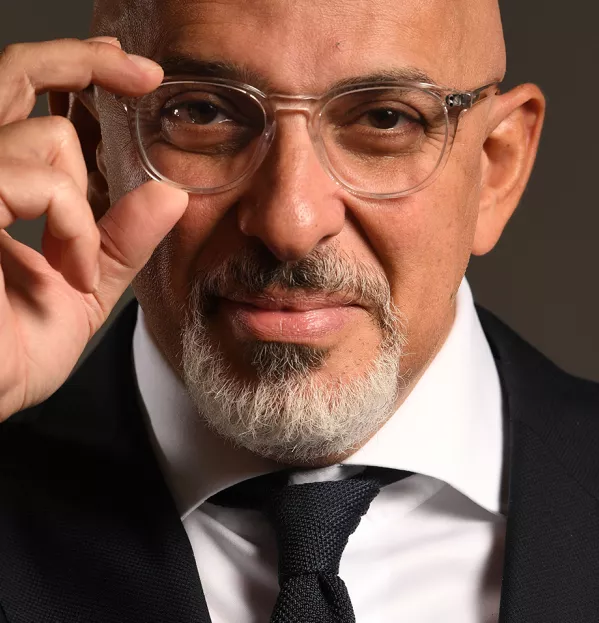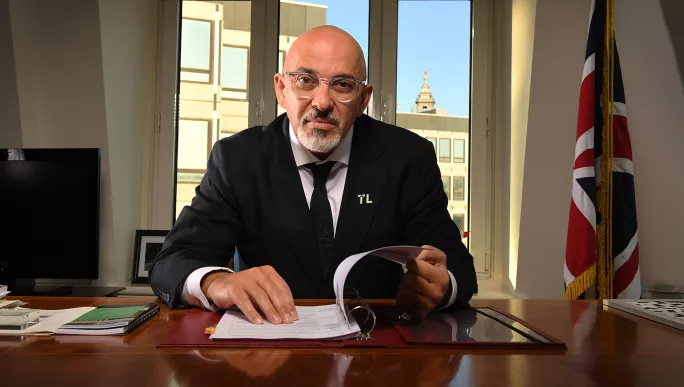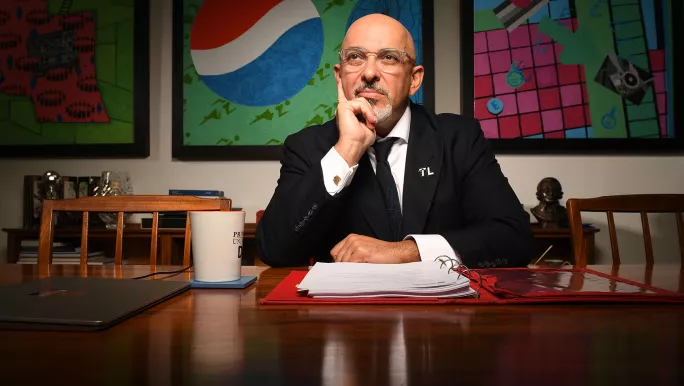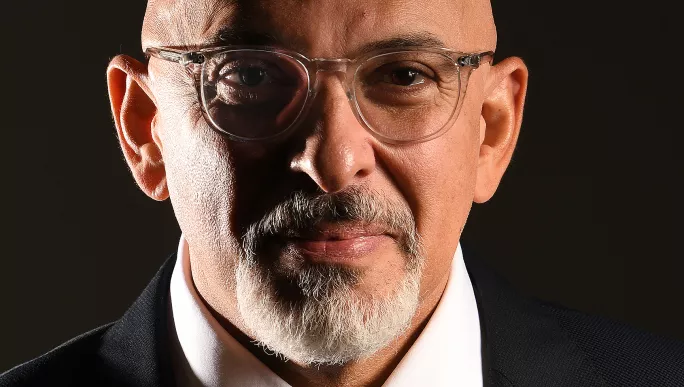Exclusive: Nadhim Zahawi on what he is going to do next

Sometimes, when Nadhim Zahawi is facing a particularly tough grilling by journalists or MPs, a vein in his left temple pulses ever so slightly.
Barely noticeable, it is often the only discernible sign that the education secretary is feeling under pressure.
This seemingly unflappable manner has endeared him to many he has worked with - both in education and in his former role as vaccines minister. Past and present colleagues also describe him with adjectives such as “smooth”, “charming”, “impressive”, “pleasant” and “reasonable”.
All of these qualities have been put to the test recently, as Zahawi has had to deal with the fallout from the crisis enveloping Number 10 in the wake of revelations about Downing Street parties during the first Covid lockdown. And they will be required in abundance as he prepares to steer a new set of education reforms through a torrid political landscape.
Having overseen the rollout of the vaccines, Zahawi prides himself on his ability to “deliver” - and he is itching to make a similar impact in education.
“I’m a man in a hurry,” he tells Tes at a socially distanced meeting in his Westminster office. “I think it’s only right to be working in the same way I worked on the vaccine - with that level of urgency.”
What drives him, he says, is thinking about how the education system can deliver “in every school, every college, the same consistent, high-quality education for [an] 11-year-old whose parents may not have the wherewithal to support or push and drive in the way my parents did”.
When Zahawi was 11, he left Saddam Hussein’s Iraq with his Kurdish family (“We were immigrants, not refugees”) and joined a West London comprehensive, speaking little English.
“I was wrenched away,” he recalls. “You know, by the age of 11, you’ve sort of made a few friendships. It was hard, certainly in the early days, especially if you don’t speak the language.

“And I used to hide at the back of the class. Children can be cruel…[and] my early memory was my teacher thought I had learning difficulties,” he says.
He was pushed to achieve academically by his mother, who had been a dentist in Iraq and “understood that education was the key that would unlock opportunity”.
Zahawi later moved to a private school and went on to gain a degree in chemical engineering from University College London.
“When I stand in front of the mirror in the morning I think, ‘How did I end up becoming a member of Parliament for Shakespeare [he represents Stratford-upon-Avon] and secretary of state for education, in Her Majesty’s government?’” he reflects.
But how does he think he can provide opportunities for every pupil, regardless of background or circumstance, and which reforms is he in a “hurry” to deliver in order to achieve that?
Zahawi’s educational ideology is not easy to pin down. This is partly due to the demands of Covid, partly because he has inherited a complex policy agenda, and also because, thus far, there is relatively little detail on the other areas he has chosen to focus on.
So which areas has he identified as priorities? During his maiden speech at the Conservative Party Conference last autumn, he promised a schools White Paper tackling “illiteracy and innumeracy”, though - Tes understands - he was later advised to be cautious about this language, with its suggestion that many children were unable to read after more than a decade of Conservative rule.
There is also a long-awaited review into special educational needs and disabilities due this spring, which Zahawi has said is “close to his heart”, having had SEND on his portfolio previously as children’s minister under Theresa May.
Zahawi has previously pledged to put wellbeing “at the centre of everything we do in schools”, which he sees as working alongside clear behaviour policies. He lavishes praise on Hammersmith Academy in West London, at which pupils “wear a smart suit, are expected to behave with respect and to be in school ready to learn, but also they do lots of pastoral care”.
His emphasis on behaviour (“An incredibly important part of delivering the best outcome and allowing young minds to really flourish and do well”) is interesting given that he was, by his own admission, a “very naughty” pupil.
He still bears the literal scars of his “boisterous and difficult” behaviour, after trying to “jump a hedge” at his school in Baghdad and being “skewered” midair, his shin pierced by a rusty pipe, requiring hospital treatment.
He is grateful to his “amazing” headteacher back in Iraq, Miss M’barack, for helping him to focus. “She made me realise that if I continue to misbehave, I’m going to struggle. Whereas if I put that same level of energy into my work into my education…”
‘I think it’s only right to be working on education in the same way I worked on the vaccine - with that level of urgency’
Yet another focus is pupil attendance. Shortly after his appointment, Zahawi said that the government “won’t stand back and let attendance fall”. Since then, though, Covid absence has more than tripled thanks to the Omicron variant.
The education secretary has set up an “attendance alliance”, which he chairs, looking at non-Covid absence. Meanwhile, Ofsted has been asked to carry out a review of best practice on attendance in schools and five attendance advisers have been appointed to support schools and local authorities.
Separating Covid from non-Covid absence will be difficult; many school leaders will know of healthy students staying at home to protect vulnerable family members while the pandemic is ongoing, and others struggling with school routine after a long period of stop-start lockdowns.
But Zahawi wants to probe why schools with similar intakes are seeing different attendance levels. He thinks it partly comes down to school culture, and holds up Hammersmith Academy in London - again - as an exemplar.
“The pastoral work that the school does, the relationship they have with parents…they can have really meaningful conversations and have that support,” he says.
Fine, some heads will say, but what about cuts to local authority attendance officers and community policing, and school budget squeezes that have forced them to shed teaching assistants? What about the complex SEND and socioeconomic reasons for non-attendance? Is this really all about culture, or will extra resources be needed?
“So, I think we’ve got we’ve got a really strong settlement in the CSR [Comprehensive Spending Review],” asserts Zahawi, adding: “For schools, I remember, when I first walked into this office, there was a headline of rumours that, you know, Sajid [Javid] and health are going to do well, and Zahawi in education is going to be the loser. That didn’t materialise.”
Funding is one area he hasn’t talked much about. While the Budget was more generous towards schools than expected, it merely restores per-pupil funding to 2010 levels in real terms - and the extra £1.8 billion on catch-up was described as a “long way short of what is needed” by education leaders.
Zahawi reiterates, though, that schools received “a really strong settlement” and says, “I’m happy where we are in terms of funding.”

With so many areas catching his attention, structural changes to the education system may, you might think, be on hold. But in reality, all of the areas outlined above will likely fall into the shadow of what is expected to be Zahawi’s major focus: the unfinished business of academisation. While 78 per cent of secondaries are academies or free schools, this only applies to 37 per cent of primaries.
He has previously said there will be no “arbitrary deadline” for academisation and he veers away from saying whether he could live with a mixed economy of academies and maintained schools.
What is clear, though, is that he favours multi-academy trusts (MATs). “The evidence in my view - and we will share this in the White Paper - is that families of schools that are tightly managed and supported have outperformed other ways of organising our school system, and actually have been able to be far more resilient in the face of a global pandemic,” he states.
So what levers is he prepared to pull, or will we continue to see more of a soft-touch approach? “As long as you follow the evidence, I think you will carry people with you,” he says.
As well as getting more schools to join MATs, Zahawi wants tougher action on academy trusts with low Ofsted ratings.
“Why should we tolerate schools that may be in an academy, but are consistently ‘requiring improvement’?” he asks. “We need to be able to make sure that those schools do better quickly because of the way we only intervene when a school fails.”
Each day that goes by with children “not getting the education they deserve” means he is “hurting their life choices”, Zahawi says. “And that is something, you know, I go to bed at night thinking about,” he adds.
Unlike some of his predecessors, however, it is not Zahawi’s style to aggressively force through change. He likes to call himself the “evidence-led secretary of state” and hopes to persuade school leaders using compelling facts.
His own decisions are, he says, made by studying the evidence. This may be a welcome change for a profession used to policies rooted in entrenched ideology.
“He’s different from [Michael] Gove in that he hasn’t arrived with lots of preconceived ideas,” says Sam Freedman, who advised the former education secretary and is an Institute for Government fellow, as well as a Tes columnist.
“He doesn’t come in with a [former schools minister] Nick Gibb-style set of beliefs of what’s right and wrong,” Freedman adds.
Geoff Barton, general secretary of the Association of School and College Leaders, hopes that in forming policies, he will canvass a wider range of views than some of his predecessors who “listened to the same favourites”. Academies minister Baroness Barran has committed to speak with a broad group of school leaders, he points out.
‘Why should we tolerate schools that may be in an academy, but are consistently ‘requiring improvement’? We need to be able to make sure that those schools do better quickly’
Yet it would be naive to expect fresh conversations or evidence reviews to result in a sweeping set of U-turns; Zahawi and his advisers are unlikely to turn against longstanding Tory policy.
But he does seem genuinely interested in making his own assessments of the facts, and peppers his conversation with statistics, a habit presumably picked up during his pre-political career as a pollster.
After working in marketing - perhaps referenced in the Derek Boshier pop art above his desk - and campaigning with Jeffrey Archer, including on his ill-fated 1999 London mayoral bid, Zahawi co-founded YouGov.
Assessing facts and figures is a tactic he later practised as vaccines minister, when he held briefings for MPs every Friday, flanked by senior figures from NHS England and the Joint Committee on Vaccination and Immunisation.
Part of this involved convincing MPs that there was no strong case for teachers to be prioritised for Covid-19 vaccines - which Labour leader Kier Starmer had called for. Identifying all NHS patients’ occupations, Zahawi argued, would delay the rollout and ultimately put more teachers at risk.
He contrasts England’s approach with that of other countries which, he said, lacked effective ways to evaluate the scientific evidence and therefore “bent to the will of the unions” in prioritising teachers for vaccines.
However, some see limitations to Zahawi’s “evidence-led” approach. “For some things, there isn’t any strong evidence,” says Freedman. He cites school uniforms and options for structural reform as examples.
Others may point to the evidence for face masks in schools, which the government’s own review found was “not conclusive”.
But Zahawi relishes changing people’s minds. “Just saying that’s the way it is, is not good enough, in my view - that has always driven me,” he says, adding: “You know, I wake up in the morning, I like my cup of tea in a certain way. And if you’re going to deliver my cup of tea differently, then you better explain to me why.”
His ability to balance mundane, recognisable examples with hard facts is part of what makes him an effective communicator.
He has an undeniable human touch, with one senior education figure commenting that his letters to the profession come across as more “heartfelt” than those of his predecessors.
And his department, deeply demoralised after the Gavin Williamson era, is said to be buoyed by its personable leader, who happily explains to Tes, when asked, that the glitterball trophy on his sideboard was awarded for coming second in the DfE’s “Strictly” Christmas dance contest charity fundraiser while he was children’s minister. The contest also featured former permanent secretary Jonathan Slater and a judging panel, he adds unhesitatingly; the winner is not revealed.
Yet while Zahawi is widely liked, there have been occasional slip-ups. In 2013, the keen horse rider and showjumper said he was “mortified” that taxpayers had subsidised the electricity supply to his stables, which he put down to a mistake. As children’s minister, he apologised for attending the notorious men-only President’s Club fundraiser - at which female hostesses were allegedly groped - and called such behaviour “shocking”.
The hugely wealthy minister, whose property empire alone is worth tens of millions, was also criticised last year for wrongly claiming that research showed parents “actually prefer to pay a modest sum” of “£1 or £2”, instead of receiving free school meals.
And, while many praise Zahawi’s diplomacy, there is also a concern among some that he “plays to the gallery”. One education figure highlights how, when discussing exams in Parliament earlier this month, Zahawi confirmed there was “no Plan B” - despite the government publishing contingency plans for the very possibility of exams being cancelled.

Zahawi is resolutely determined to see exams this summer. But with one in four teachers reporting that staff absence is having a “major impact” on their schools, and Year 11s missing half a day of schooling per week on average last term as Omicron cases soared, are more mitigations needed?
No, because Ofqual’s planning work “assumed” that we would have some form of variant virus that would spike in that period, he replies, adding that he is convinced the pandemic is transitioning into its endemic stage.
Covid’s legacy, though, will live on in the children whose education has been so badly disrupted by the pandemic. The resignation of catch-up tsar Sir Kevan Collins due to what he described as the government’s “feeble” recovery plan may have happened before Zahawi’s time, but there are growing concerns about the National Tutoring Programme under his watch. Under particular scrutiny is the performance of Randstad, the Dutch firm paid £25 million to run the NTP - dubbed a “scandalous failure” at last week’s Education Select Committee hearing.
Is the evidence-led secretary of state for education satisfied with Randstad’s current performance, based on the evidence that he has seen? “We are in a positive place, I can always do more. I’m going to keep pushing Randstad and everyone else to make sure we keep delivering,” he says.
Zahawi is masterful at deflecting questions and - even during fractious TV interviews - rarely strains his voice or appears irritated.
He polls highly among Tory party members and is seen as a potential future party leader, though is characteristically adept at dodging questions about this possibility.
These questions have grown over the past week, but at the time of writing, he was remaining steadfastly loyal to his boss.
It is an increasingly difficult path for him to tread. On 20 May 2020, when 100 of Boris Johnson’s staff were invited to a “bring your own booze” gathering, schools were finding new ways to educate - and in some cases feed - children remotely, as well as teaching key-worker pupils on site. Frazzled parents were homeschooling; children were isolated from their friends.
Zahawi responds: “You’re absolutely right that schools were finding it really hard and I thank school leaders…I completely understand whether it’s school leaders, teachers, parents, students, the frustration [and] anger by some of these stories.”
He continues: “I lost an uncle to Covid. He was in hospital, visiting was limited. I couldn’t see him. I couldn’t bury him…So I, listen, this stuff is painful. But at the same time, I think it’s important that Sue Gray completes the investigation.”
Whatever that inquiry brings - including the possibility of a reshuffle and resulting promotion - for now, he has an education brief to attend to - one with a hugely intricate set of issues to navigate.
For the “man in a hurry” there is no time to waste. While Zahawi doesn’t want to be “dogmatic” in the process of ensuring all children access a high-quality education, he wants everyone on board quickly because “the sooner we get there on that journey, the better the outcomes”.
Taking too long will result in “lost generations”, he warns. “And that is not something that I’m willing to accept. Nor do I think teachers want that either.”
You need a Tes subscription to read this article
Subscribe now to read this article and get other subscriber-only content:
- Unlimited access to all Tes magazine content
- Exclusive subscriber-only stories
- Award-winning email newsletters
Already a subscriber? Log in
You need a subscription to read this article
Subscribe now to read this article and get other subscriber-only content, including:
- Unlimited access to all Tes magazine content
- Exclusive subscriber-only stories
- Award-winning email newsletters
topics in this article



